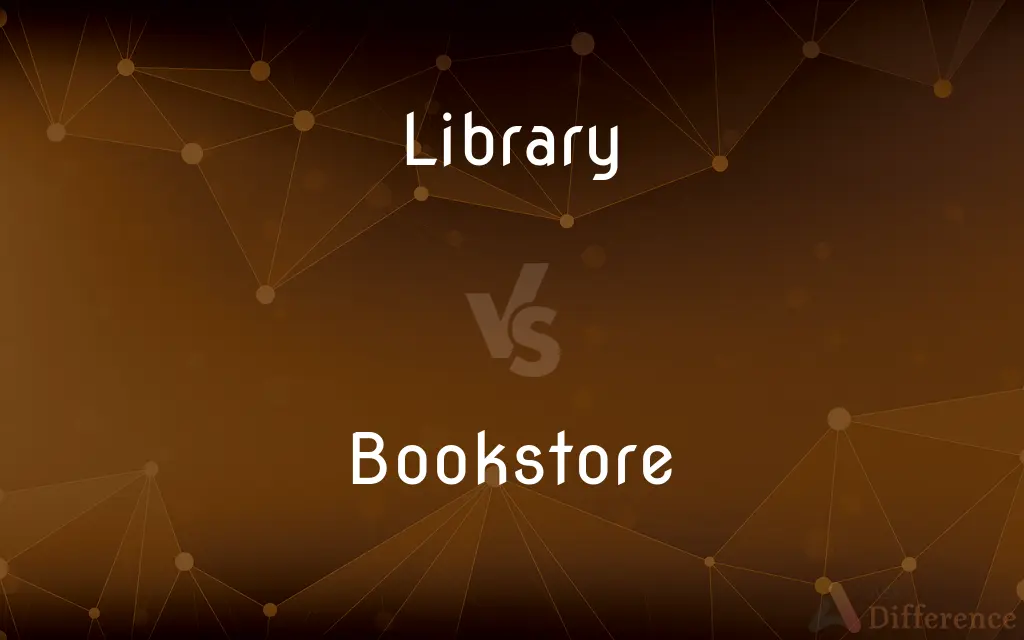Library vs. Bookstore — What's the Difference?
By Fiza Rafique & Urooj Arif — Updated on March 30, 2024
Libraries offer free access to books for borrowing, emphasizing knowledge sharing, while bookstores sell books for ownership, focusing on commerce.

Difference Between Library and Bookstore
Table of Contents
ADVERTISEMENT
Key Differences
Libraries serve as community centers for free access to books, information, and resources, allowing individuals to borrow materials for a limited time. They are funded by public or private entities and prioritize education, literacy, and access to information for all demographics. On the other hand, bookstores are retail outlets that sell books and sometimes other related items like magazines, stationery, and gifts. Their primary goal is commerce, providing customers with the opportunity to purchase books for personal ownership.
While libraries offer a wide range of services including book lending, reading programs, and community events, bookstores may host author readings, signings, and book launches, but their main function remains the sale of books and literary merchandise. Libraries often provide a quiet space for reading and study, free internet access, and community programs, aiming to foster a love for reading and lifelong learning. Conversely, bookstores create a commercial environment focused on the latest publications, bestsellers, and niche markets, catering to the purchasing preferences of readers.
In terms of collection, libraries curate a diverse range of materials, including books, digital media, and sometimes rare or specialized collections, accessible to the public for borrowing. Bookstores, while also offering a wide selection, prioritize stocking books that are currently popular or in demand, with a focus on selling rather than lending.
The funding model is another key difference: libraries are typically supported by public funding, donations, and sometimes membership fees, reflecting their role as a public service. Bookstores operate on a for-profit basis, relying on sales revenue to sustain their business.
The user experience in libraries is centered around exploration, learning, and community engagement, without the pressure to make a purchase. In bookstores, the experience is geared towards browsing, discovering new titles for purchase, and enjoying the physical space, which may include café services or comfortable reading areas.
ADVERTISEMENT
Comparison Chart
Primary Purpose
Lending books and providing information
Selling books and literary merchandise
Funding
Public or private funding, donations
Sales revenue
Services
Borrowing, community programs, study spaces
Sales, author events, reading spaces
Collection
Diverse, including digital and rare items
Current, popular, and niche titles
User Experience
Education and community focused
Commerce and discovery focused
Compare with Definitions
Library
An institution promoting literacy and learning.
The library hosted a reading program for kids during the summer.
Bookstore
A retail outlet selling books and literary items.
The bookstore downtown has an extensive collection of science fiction.
Library
A place offering free access to books and resources for borrowing.
She visits the library weekly to borrow new novels.
Bookstore
A venue for author readings and signings.
The bookstore regularly hosts events with popular authors.
Library
A collection accessible to the public or specific groups.
The university library's collection includes rare manuscripts.
Bookstore
A place for discovering and purchasing new books.
She found a rare edition of her favorite novel at the bookstore.
Library
A community center for educational programs.
The library offers workshops on digital literacy for seniors.
Bookstore
A source for educational materials and textbooks.
Students buy their textbooks from the university bookstore.
Library
A service providing digital resources and internet access.
He used the library's computers to research for his paper.
Bookstore
A commercial space offering a selection of bestsellers.
The bookstore's front display features the latest bestsellers.
Library
A library is a collection of materials, books or media that are easily accessible for use and not just for display purposes. It is responsible for housing updated information in order to meet the user's needs on a daily basis.
Bookstore
A store where books are sold.
Library
A building or room containing collections of books, periodicals, and sometimes films and recorded music for use or borrowing by the public or the members of an institution
A library book
A university library
Bookstore
A store where books are bought and sold.
Library
A place in which reading materials, such as books, periodicals, and newspapers, and often other materials such as musical and video recordings, are kept for use or lending.
Bookstore
A store where books are kept for sale; - called in England a bookseller's shop.
Library
A collection of such materials, especially when systematically arranged.
Bookstore
A shop where books are sold
Library
A room in a private home for such a collection.
Library
An institution or foundation maintaining such a collection.
Library
A series of books issued by a publisher.
Library
A collection of standard routines used in computer programs, usually stored as an executable file.
Library
A collection of cloned DNA sequences whose location and identity can be established by mapping the genome of a particular organism.
Library
A collection of proteins generated from the collected DNA sequences that express them, used for tracking metabolic functions of proteins in diseases such as cancer, for the synthesis of new drugs, and for other proteomics research.
Library
An institution which holds books and/or other forms of media for use by the public or qualified people often lending them out, as well as providing various other services for its users.
Library
(by extension) Any institution that lends out its goods for use by the public or a community.
Library
A collection of books or other forms of stored information.
Library
An equivalent collection of analogous information in a non-printed form, e.g. record library.
Library
A room dedicated to storing books.
Library
(computer programming) A collection of software routines that provide functionality to be incorporated into or used by a computer program.
Library
(genetics) A collection of DNA material from a single organism or relative to a single disease.
Library
(card games) The deck or draw pile.
Library
A considerable collection of books kept for use, and not as merchandise; as, a private library; a public library.
Library
A building or apartment appropriated for holding such a collection of books.
Library
A room where books are kept;
They had brandy in the library
Library
A collection of literary documents or records kept for reference or borrowing
Library
A depository built to contain books and other materials for reading and study
Library
(computing) a collection of standard programs and subroutines that are stored and available for immediate use
Library
A building that houses a collection of books and other materials
Common Curiosities
Can you buy books at a library?
Libraries primarily lend books, but they may sell used or donated books as part of fundraising efforts.
How do libraries and bookstores acquire their books?
Libraries acquire books through purchases, donations, and public funding, while bookstores purchase their stock from publishers or distributors.
Can anyone access a library?
Most public libraries are open to everyone, though some services may be limited to cardholders or residents of a particular area.
What is the main difference between libraries and bookstores?
The main difference lies in their purpose: libraries focus on lending and education, while bookstores focus on selling books for profit.
Do bookstores offer the same services as libraries?
While bookstores focus on selling books, some offer additional services like reading spaces and author events, but not lending services.
Are digital books available in libraries and bookstores?
Yes, libraries lend digital books, and bookstores sell them, often in the form of e-books or audiobooks.
How do libraries and bookstores complement each other?
Libraries and bookstores both promote reading and literacy but cater to different needs—borrowing vs. ownership, respectively.
How do libraries adapt to technological changes?
Libraries incorporate digital lending, online databases, and e-learning resources to stay relevant and accessible.
Can you request books at a library or bookstore?
Yes, libraries accept requests for books to add to their collection, and bookstores can special order books for purchase.
How do libraries support community literacy?
Libraries offer literacy programs, educational workshops, and access to a wide range of reading materials for all ages.
What kind of community events do libraries host?
Libraries host a variety of community events, including literacy classes, book clubs, and cultural presentations.
Are there fees associated with library services?
Most library services are free, but there may be fees for late returns, printing, or certain classes.
What role do bookstores play in the publishing industry?
Bookstores are crucial for the distribution and sale of books, influencing trends and promoting authors.
What makes independent bookstores unique?
Independent bookstores often curate a unique selection, foster a sense of community, and provide a personalized shopping experience.
Do bookstores contribute to the local economy?
Yes, as commercial businesses, bookstores contribute to the local economy through sales, employment, and taxes.
Share Your Discovery

Previous Comparison
Tilt vs. Pivot
Next Comparison
Invincible vs. InvulnerableAuthor Spotlight
Written by
Fiza RafiqueFiza Rafique is a skilled content writer at AskDifference.com, where she meticulously refines and enhances written pieces. Drawing from her vast editorial expertise, Fiza ensures clarity, accuracy, and precision in every article. Passionate about language, she continually seeks to elevate the quality of content for readers worldwide.
Co-written by
Urooj ArifUrooj is a skilled content writer at Ask Difference, known for her exceptional ability to simplify complex topics into engaging and informative content. With a passion for research and a flair for clear, concise writing, she consistently delivers articles that resonate with our diverse audience.













































